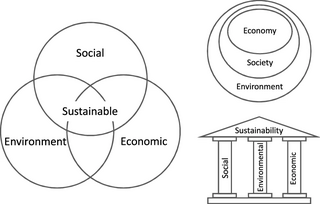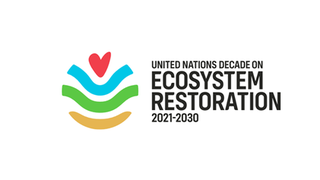
Natural resources are resources that are drawn from nature and used with few modifications. This includes the sources of valued characteristics such as commercial and industrial use, aesthetic value, scientific interest, and cultural value. On Earth, it includes sunlight, atmosphere, water, land, all minerals along with all vegetation, and wildlife.

The United Nations Environment Programme (UNEP) is responsible for coordinating responses to environmental issues within the United Nations system. It was established by Maurice Strong, its first director, after the United Nations Conference on the Human Environment in Stockholm in June 1972. Its mandate is to provide leadership, deliver science and develop solutions on a wide range of issues, including climate change, the management of marine and terrestrial ecosystems, and green economic development. The organization also develops international environmental agreements; publishes and promotes environmental science and helps national governments achieve environmental targets.

Sir Robert Tony Watson CMG FRS is a British chemist who has worked on atmospheric science issues including ozone depletion, global warming and paleoclimatology since the 1980s. Most recently, he is lead author of the February 2021 U.N. report Making Peace with Nature.

Environmental degradation is the deterioration of the environment through depletion of resources such as quality of air, water and soil; the destruction of ecosystems; habitat destruction; the extinction of wildlife; and pollution. It is defined as any change or disturbance to the environment perceived to be deleterious or undesirable. The environmental degradation process amplifies the impact of environmental issues which leave lasting impacts on the environment.

Ecosystem services are the various benefits that humans derive from healthy ecosystems. These ecosystems, when functioning well, offer such things as provision of food, natural pollination of crops, clean air and water, decomposition of wastes, or flood control. Ecosystem services are grouped into four broad categories of services. There are provisioning services, such as the production of food and water. Regulating services, such as the control of climate and disease. Supporting services, such as nutrient cycles and oxygen production. And finally there are cultural services, such as spiritual and recreational benefits. Evaluations of ecosystem services may include assigning an economic value to them.
The International Institute for Environment and Development (IIED) is an independent policy research institute whose stated mission is to "build a fairer, more sustainable world, using evidence, action and influence in partnership with others." Its director is Dr Tom Mitchell.

The following outline is provided as an overview of and topical guide to sustainability:

Sustainability is a social goal for people to co-exist on Earth over a long time. Definitions of this term are disputed and have varied with literature, context, and time. Experts often describe sustainability as having three dimensions : environmental, economic, and social, and many publications emphasize the environmental dimension. In everyday use, sustainability often focuses on countering major environmental problems, including climate change, loss of biodiversity, loss of ecosystem services, land degradation, and air and water pollution. The idea of sustainability can guide decisions at the global, national, and individual levels. A related concept is sustainable development, and the terms are often used to mean the same thing. UNESCO distinguishes the two like this: "Sustainability is often thought of as a long-term goal, while sustainable development refers to the many processes and pathways to achieve it."

Environmental issues are disruptions in the usual function of ecosystems. Further, these issues can be caused by humans or they can be natural. These issues are considered serious when the ecosystem cannot recover in the present situation, and catastrophic if the ecosystem is projected to certainly collapse.

The Economics of Ecosystems and Biodiversity (TEEB) was a study led by Pavan Sukhdev from 2007 to 2011. It is an international initiative to draw attention to the global economic benefits of biodiversity. Its objective is to highlight the growing cost of biodiversity loss and ecosystem degradation and to draw together expertise from the fields of science, economics and policy to enable practical actions. TEEB aims to assess, communicate and mainstream the urgency of actions through its five deliverables—D0: science and economic foundations, policy costs and costs of inaction, D1: policy opportunities for national and international policy-makers, D2: decision support for local administrators, D3: business risks, opportunities and metrics and D4: citizen and consumer ownership.
Environmental governance (EG) consists of a system of laws, norms, rules, policies and practices that dictate how the board members of an environment related regulatory body should manage and oversee the affairs of any environment related regulatory body which is responsible for ensuring sustainability (sustainable development) and manage all human activities—political, social and economic. Environmental governance includes government, business and civil society, and emphasizes whole system management. To capture this diverse range of elements, environmental governance often employs alternative systems of governance, for example watershed-based management. Obviously, in fact the EG arrangements are very diversed and not at all as inclusive as we could wish them to be.

The International Resource Panel is a scientific panel of experts that aims to help nations use natural resources sustainably without compromising economic growth and human needs. It provides independent scientific assessments and expert advice on a variety of areas, including:

Pavan Sukhdev is an Indian environmental economist whose field of studies include green economy and international finance. He was the Special Adviser and Head of UNEP's Green Economy Initiative, a major UN project suite to demonstrate that greening of economies is not a burden on growth but rather a new engine for growing wealth, increasing decent employment, and reducing persistent poverty. Pavan was also the Study Leader for the ground breaking TEEB study commissioned by G8+5 and hosted by UNEP. Under his leadership, TEEB sized the global problem of biodiversity loss and ecosystem degradation in economic and human welfare terms, and proposed solutions targeted at policy-makers, administrators, businesses and citizens. TEEB presented its widely acclaimed Final Report suite at the UN meeting by Convention on Biological Diversity (CBD) in Nagoya, Japan.

Tan Sri Zakri bin Abdul Hamid has had a distinguished career in science as a researcher, educator, administrator and diplomat.

The Environmental Protection Agency, is an agency of Ministry of Environment, Science, Technology and Innovation, established by EPA Act 490 (1994). The agency is dedicated to improving, conserving and promoting the country’s environment and striving for environmentally sustainable development with sound, efficient resource management, taking into account social and equity issues. It oversees the implementation of the National Environment Policy. EPA Ghana's mission is to manage, protect and enhance the country’s environment and seek common solutions to global environmental problems. Its mission is to be achieved through an integrated environmental planning and management system with broad public participation, efficient implementation of appropriate programs and technical services, advice on environmental problems and effective, consistent enforcement of environmental law and regulations. EPA Ghana is a regulatory body and a catalyst for change to sound environmental stewardship.
Global Environmental Governance is the title of a book written by Adil Najam, Mihaela Papa and Nadaa Taiyab. All the information of this article comes from this book.

Bradnee Chambers was an expert on international environmental governance, law and politics. In March 2013 he was appointed as the Executive Secretary of the Convention on the Conservation of Migratory Species of Wild Animals (CMS), a main United Nations multilateral conservation treaty He was also the acting Executive Secretary of the Gorilla Agreement and the Agreement on the Conservation of Small Cetaceans in the Baltic, North East Atlantic, Irish and North Seas (ASCOBANS) both administered under the UN Environment Programme. These agreements form the global framework for conservation of wild animals migrating between countries. The agreements cover an immense scope of wildlife including whales, dolphins, sharks, elephants, big cats, bats, monarch butterflies, saiga antelope, waterbirds, and migratory fish.

The United Nations Decade on Ecosystem Restoration runs from 2021 to 2030. Similar to other nature related international decades, its purpose is to promote the United Nation's environmental goals. Specifically, to facilitate global cooperation for the restoration of degraded and destroyed ecosystems. Along with fostering efforts to combat climate change, safeguard biodiversity, food security, and water supply. While much focus is on promoting restoration activity by national governments, the UN also wishes to promote such efforts from other actors, ranging from the private sector and NGOs to regular individuals.
Sustainable population refers to a proposed sustainable human population of Earth or a particular region of Earth, such as a nation or continent. Estimates vary widely, with estimates based on different figures ranging from 0.65 billion people to 9.8 billion, with 8 billion people being a typical estimate. Projections of population growth, evaluations of overconsumption and associated human pressures on the environment have led to some to advocate for what they consider a sustainable population. Proposed policy solutions vary, including sustainable development, female education, family planning and broad human population planning.















